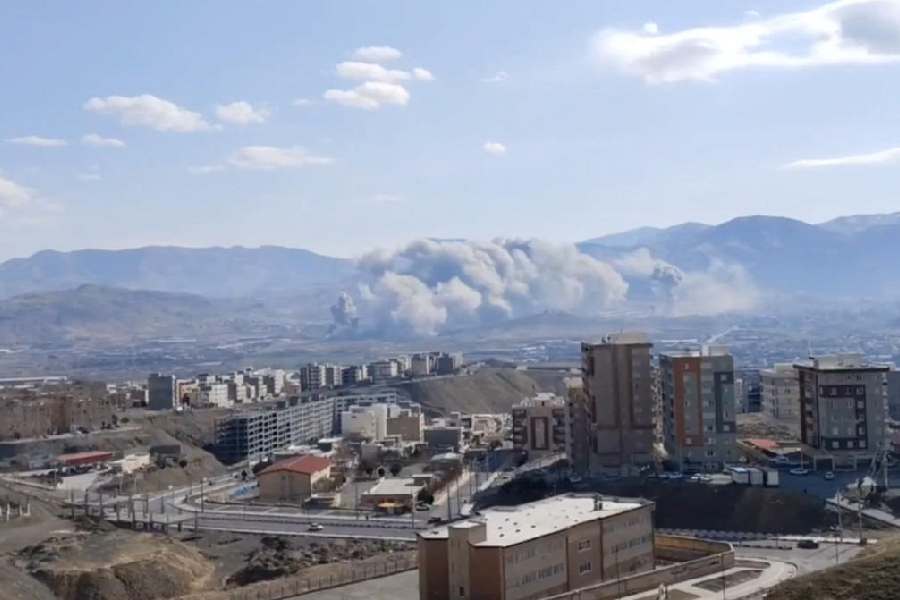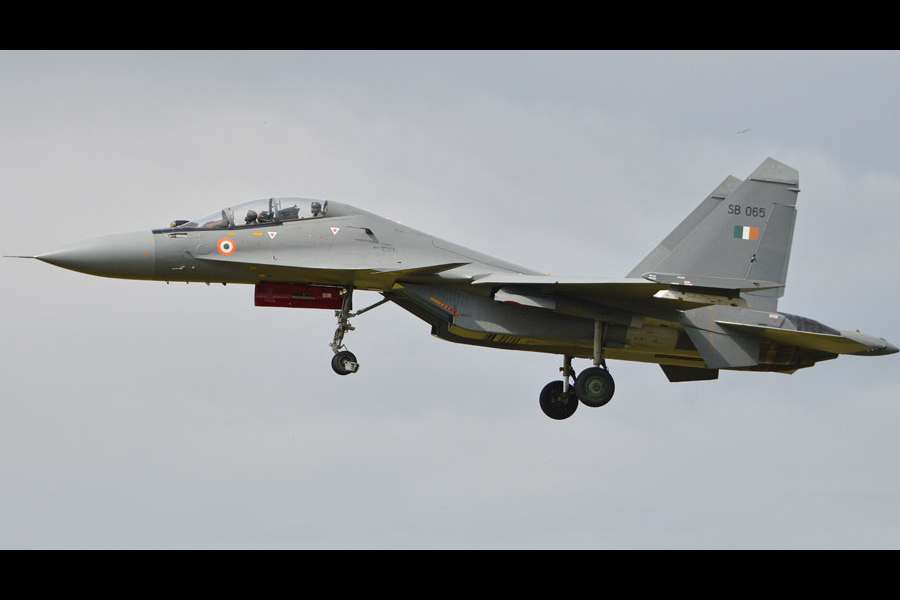 |
 |
| Palestinian youths throw stones at Israeli police in Jerusalem (below); Kashmiri protesters throw stones in Srinagar. (File pictures) |
Jersusalem, Aug. 5: Imagine that! Indian Army generals being lectured on human rights by their Israeli counterparts in Jammu and Kashmir!
With Kashmir on the boil once again, this may be a significant one among many keys to unravelling recent events which have brought the troubled northern state to its current pass and why the situation on the ground threatens to get worse.
According to Daniel Reisner, Indian generals have been telling the Israelis during formal exchanges that every door in Kashmir that is suspected of hiding weapons behind them ought to be kicked open and if weapons are found, those occupying the houses should be “treated” as terrorists engaged in or aiding the insurgency.
Reisner was a senior member of Israeli Prime Minister Ehud Barak’s delegation to the failed Camp David talks in July 2000, brokered by President Bill Clinton on a “final status settlement” to the Israeli-Palestinian conflict.
A reserve colonel now, he once headed the international law department of the Israeli Defence Forces’ (IDF) Advocate General’s Corps and had key responsibilities in the investigation or prosecution of Israeli soldiers for civil and human rights violations during the Palestinian intifada in the occupied territories.
In America, Reisner is viewed as the Israeli equivalent of US federal judge Jay Bybee, who wrote the now infamous Bush administration memos arguing for the legality of torture.
This is because of Reisner’s role in rewriting the IDF’s rules of engagement of Palestinians who threw stones at Israeli soldiers or incited other forms of attack against Israelis in the West Bank and Gaza much the same way Kashmiri youths are today throwing stones and attacking security forces in Kashmir.
Israel, according to Reisner, stopped dealing with such attacks as a law and order problem and hardened its response about seven years ago after he helped rewrite the IDF’s rules of engagement.
Even so, the callous and insensitive statements he attributed to Indian generals about civilian unrest in Kashmir appear to have shocked the Israelis, who are among those most criticised in the international community for alleged human rights violations in dealing with the Palestinians in territories occupied by Israel after the 1967 Arab-Israeli war.
This came through during Reisner’s interaction last week with a group of Indian journalists visiting Israel.
Reisner, who continues to be a key adviser to the Israeli government on the Arab-Israeli peace process indicated that the Israelis, from their experience, told the Indian generals that their army’s policies in Kashmir will not work unless they wanted to cut off their civilian adversaries altogether as Israel has now done in the Gaza Strip following the ascent of Hamas to power.
Reisner did not identify the generals, although he made it clear that their idea of breaking down every door in Kashmir which is suspected of hiding weapons with impunity was not an isolated view and that it represented the collective approach of the Indian security forces.
India engages in intense and extensive interaction with the Israeli defence establishment. Israel is now the second biggest source of arms for India and may soon overtake Russia as its No.1 arms supplier, according to sources here.
Ironically, even as the Indian Army has been advocating unrestrained and irrational use of force in civilian unrest as their policy, according to Reisner, the ministry of external affairs (MEA) has issued a spate of statements criticising Israel for the use of force against Palestinians.
In one of several such statements about the situation in the Gaza Strip which would appear to be a case of the right hand of the Indian government not knowing what its left hand is doing, MEA stated: “It is disappointing to note that the use of disproportionate force (by Israel) is resulting in a large number of civilian casualties (in Gaza) on the one hand and the escalating violence on the other.
“This continued use of indiscriminate force is unwarranted and condemnable. The government of India urges utmost restraint (by Israel) so as to give peace a chance as the peace process may well get derailed irreversibly.”
In a recent reply to the Lok Sabha, the government reported that during a 23-day period upto January 18, 2009, “over 1,200 Palestinians, including civilians and children, were reportedly killed. Thirteen Israelis are also said to have been killed”.
The Lok Sabha was also told that India had called “for an immediate end to the disproportionate and condemnable use of force (by Israel), particularly against civilians, and for the restoration of peace”.
Last week, external affairs minister S.M. Krishna drew attention of Lok Sabha members to India’s condemnation of Israel’s attack on a flotilla of ships which attempted to break Tel Aviv’s blockade of Gaza in May.
That action resulted in the loss of nine lives and injuries to several others.
Krishna quoted from India’s condemnation of the attack on the flotilla: “India deplores the tragic loss of life and the reports of killings and injuries to people on the boats carrying supplies for Gaza. There can be no justification for such indiscriminate use of force, which we condemn.”
Last year, responding to a “flash appeal” by UN Relief and Works Agency (UNRWA) for Palestinian refugees, India gave $1 million for the affected families in Gaza.
In addition, to mark UNRWA’s 60th anniversary, the UPA government enhanced its regular contribution to the agency to $1 million a year “in keeping with India’s consistent and principled support for the people of Palestine”.
Reisner’s on-the-record revelations about purportedly confidential exchanges between Indian and Israeli generals surprised Indian journalists, but they concluded it may have been a deliberate Israeli attempt to draw attention to New Delhi’s double standards on tackling civilian unrest in Palestine on the one hand, and in Kashmir on the other.
If that is so, it could not have come at a worse time for India when human rights organisations worldwide are once again waking up to the Kashmir “problem”











